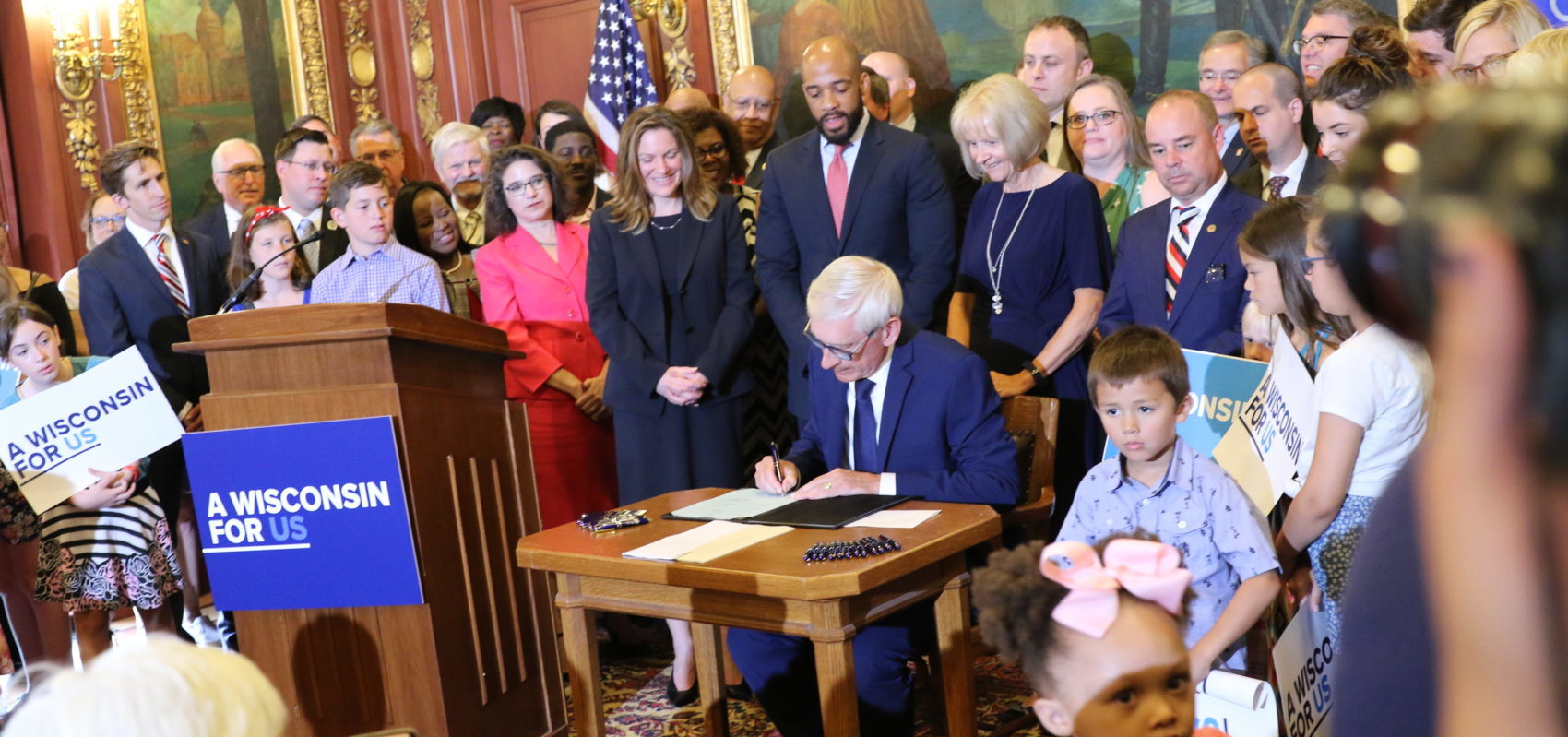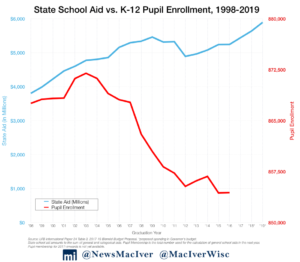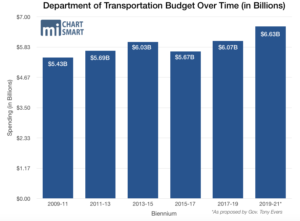
MacIver News Service | July 3, 2019
MADISON – Wisconsin governors might have the most powerful veto pen in the country, but it’s much more useful to conservatives than liberals. The pen can only take things out of the budget and reduce spending. It cannot create new items nor increase spending, at least technically.
And so, when the Republican Legislature presented Gov. Evers with their $81.4 billion budget on Friday, there was nothing Evers could do to get it back to the $84.2 billion he wanted to spend. However, he certainly was not going to sign the Republicans’ budget without making some changes. Here’s what Evers did and did not do in his 78 line-item vetoes.
- Maintains a $500 million-plus income tax cut as passed by the Legislature. The bottom two individual income tax brackets will fall over the next two years, as shown in the chart below.
- Increases per pupil school aid payments. The Legislature had proposed increasing those payments to $679 in the first year of the budget and $704 in the second year. Evers’ veto decreased the amount in the second year to $63, and then eliminated the language referring to the second year. The end result combines the $679 with $63 and puts it into effect immediately for a total annual per pupil aid amount of $742.
- Expands eligibility for a $5.3 million supplemental per pupil aid grant program. More school districts would be eligible for the additional funding compared to JFC’s budget.

- Rolled back Walker-era welfare reforms. Evers vetoed a work requirement for able-bodied adults with school-aged dependents who receive FoodShare. He also removed drug testing for FoodShare recipients who are able-bodied adults with no dependents.
- Reduces a $90 million investment in local road aid funding to $75 million, saying that the provision “creates yet another one-time subsidy to the transportation fund and illustrates the missed opportunity to provide a sustainable funding solution that would allow this program to be an ongoing investment in local communities.”
- Removes a $2.5 million mileage-based fee and tolling study for the Department of Transportation (DOT). As originally worded, this provision would have allowed for the Joint Finance Committee to include any study recommendations in the next biennial budget. Following an outcry, an amendment changed that language to allow the full legislature to pass along recommendations. Now, the entire study is deleted.
- Makes design-build official without a pilot program, and removes most of the prescriptive language in the item.

- Eliminates $18.3 million over the biennium to provide laptops for every high school freshman. That provision, which first appeared in the 2017-19 budget, was inserted into the current document in JFC’s omnibus motion on K-12 education.
- Eliminates numerous earmarks for transportation and otherwise, including a noise barrier along I-41, a required interchange on I-41, and bridge repairs in Kaukauna. Evers vetoed out a lot of items in the budget that included specific locations, but kept in the money so the DOT can spend it wherever it thinks the need is greatest.
- Vetoes out a provision that would allow Tesla to sell cars directly to consumers. That idea, while a good reform, was introduced in a last-minute amendment to secure the vote of Sen. Chris Kapenga (R-Delafield).
.@SenatorKapenga explained in a press conference minutes ago why he now a firm yes vote on the budget. #wipolitics #wibudget pic.twitter.com/qkzTcKnzPS
— MacIver Institute (@MacIverWisc) June 26, 2019
- Vetoes changes to truck fees to bring $7 million more in transportation funding. Evers’ budget retains a uniform $100 fee for trucks under 6,000 pounds, $106 for trucks between 6,000 and 8,000 pounds, and $155 for trucks between 8,000 and 10,000 pounds.
- Extends funding for 38 more state auditors through the end of the 2025 fiscal year. The JFC budget had authorized those positions through the 2023 fiscal year.
- Vetoes numerous criminal justice spending items, including funding for a new maximum security prison in Green Bay to replace a current structure.
